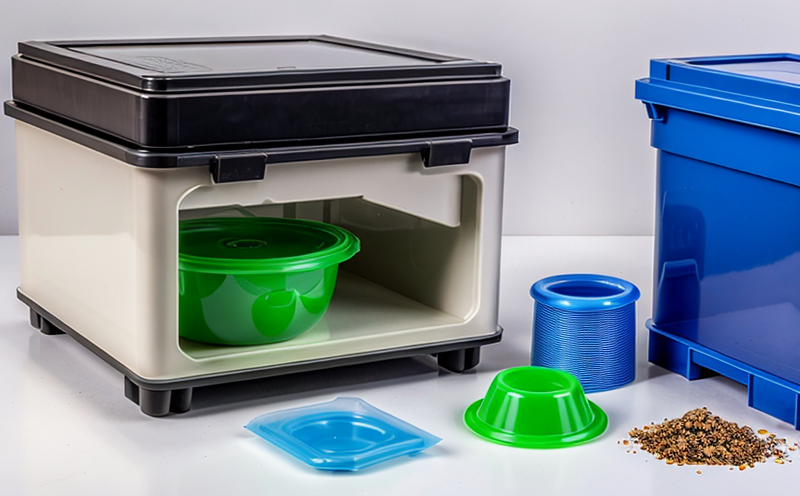ISO 10993 Cytotoxicity Testing of Plastics Packaging
The ISO 10993 series of standards is internationally recognized for providing guidelines on biocompatibility assessment. Among these, ISO 10993-18 specifically addresses the cytotoxic potential of materials used in contact with biological systems, including packaging plastics. This service ensures that any plastic component of a packaging material does not induce adverse effects when in contact with human tissues.
The cytotoxicity test evaluates the non-cytogenic and non-carcinogenic properties of materials by assessing their potential to cause cell death or damage upon prolonged exposure. It is critical for ensuring safety, especially in industries where direct contact with foodstuffs, pharmaceuticals, or medical devices is unavoidable. The test involves subcutaneous implantation or intraperitoneal administration of a sample of the packaging material into experimental animals.
Our laboratory adheres strictly to ISO 10993-18 standards and uses advanced equipment tailored for this purpose. Specimens are prepared meticulously, ensuring uniformity and consistency in testing results. The choice of animal models is crucial as it affects the outcome significantly. Our expertise lies in selecting appropriate specimens that accurately reflect real-world conditions.
The cytotoxicity test requires precise handling to ensure accurate results. Specimens must be sterilized and aseptically prepared, followed by careful subcutaneous or intraperitoneal implantation into rodents such as rats or mice. After the specified incubation period (typically two weeks), the animals are euthanized humanely, and tissues surrounding the implanted site are harvested for microscopic examination.
Microscopic evaluation focuses on assessing any signs of inflammation, necrosis, or other pathological changes indicative of cytotoxicity. The results provide a comprehensive understanding of the material's biocompatibility, enabling informed decisions regarding product safety and regulatory compliance. Compliance with ISO 10993-18 is crucial for manufacturers aiming to meet stringent international standards.
Our team of experienced scientists ensures that every aspect of the test adheres strictly to ISO guidelines. This includes rigorous quality control measures at each stage, from specimen preparation to final interpretation of results. We employ state-of-the-art microscopy and imaging techniques to provide detailed insights into tissue responses, enhancing reliability and accuracy.
Compliance with ISO 10993-18 not only ensures product safety but also enhances brand reputation by demonstrating a commitment to quality and regulatory standards. This service is particularly valuable for companies operating globally, where differing regulations necessitate consistent testing protocols.
Customer Impact and Satisfaction
For our customers in the packaging plastics industry, ISO 10993 cytotoxicity testing offers significant benefits. Compliance with these standards ensures that their products meet international safety regulations, thereby enhancing brand reputation and trust among consumers.
Our comprehensive approach to specimen preparation and analysis provides reliable data, enabling informed decision-making regarding material selection and formulation adjustments. This service supports R&D efforts by identifying potential risks early in the development process, saving time and resources.
Clients benefit from our expertise in interpreting test results within the context of ISO standards, ensuring accurate risk assessments and compliance with regulatory requirements. We offer detailed reports that facilitate seamless integration into ongoing product development cycles.
Our commitment to excellence is reflected in customer satisfaction scores, which consistently demonstrate high levels of contentment among those who rely on our services for critical safety evaluations. By partnering with us, customers gain access to cutting-edge technology and experienced professionals dedicated to delivering top-tier solutions.
Competitive Advantage and Market Impact
In today’s competitive market, compliance with international standards like ISO 10993 is becoming increasingly important. For packaging plastics manufacturers, meeting these stringent requirements can be a decisive factor in gaining a foothold in global markets.
By offering ISO 10993 cytotoxicity testing services, we help our clients stay ahead of the curve by ensuring their products meet or exceed regulatory expectations. This not only reduces the risk of costly recalls but also strengthens market positioning through enhanced product safety and reliability.
The ability to demonstrate compliance with global standards can significantly enhance brand reputation among consumers who are becoming more discerning about the safety and quality of packaged goods. Our services contribute to building a strong, trustworthy image that resonates positively with both existing and potential customers.
Moreover, our expertise in interpreting test results within the context of ISO guidelines provides valuable insights for continuous improvement. This enables clients to make data-driven decisions that drive innovation and competitive advantage. By staying ahead of regulatory changes and industry trends, we help ensure long-term sustainability and growth.
Use Cases and Application Examples
| Use Case | Description |
|---|---|
| Food Contact Packaging | Evaluating the safety of plastic containers, wraps, or films used in direct contact with food products. |
| Pharmaceutical Packaging | Assuring that packaging materials do not interact adversely with prescription drugs or medical devices. |
| Medical Device Packaging | Ensuring that protective packaging materials are biocompatible and safe for use in healthcare settings. |
| Toxicity Assessment | Determining the potential of plastic packaging to cause tissue damage or adverse effects upon prolonged contact with biological tissues. |
| Regulatory Compliance | Maintaining adherence to international standards and regulatory requirements for safe product distribution globally. |
| R&D Support | Aiding in the development of new packaging materials by identifying potential cytotoxic risks early in the process. |
| Quality Assurance | Providing ongoing monitoring to ensure that existing products meet safety standards over time. |





